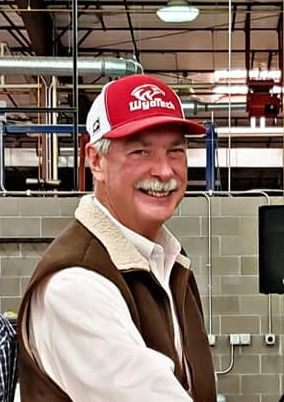Bob Martin: Welcome to this edition of Imagine America Radio in the Transportation Industry Awareness Month. Today’s podcast is going to focus on automotive careers, and our guest is Jim Mathis, president and CEO of WyoTech. For those of you who are not aware of WyoTech, it was founded in Laramie, Wyoming, in 1966. The goal of the school was very simple: provide a top-notch, concentrated training program that prepared students for the growing demand of technicians in the automotive and diesel careers. Since that time, WyoTech has helped tens of thousands of graduates obtain training and go on to pursue great careers with a seemingly endless limit of companies and employers located across the globe employing WyoTech graduates. We’ve invited Jim to talk about the future of automotive careers. Jim, welcome to the show. |
Jim Mathis: Thank you, Bob. |
Bob: So why don’t we just start out immediately saying—why don’t you, for the benefit of our audience—which are going to be primarily educators with students that are looking at, or might potentially be looking at, automotive or technical careers—tell us a little bit about exactly what you see is automotive/diesel technical career opportunity. |
Jim: Yeah. Thank you. We’ve never seen it any better than what we have currently. And as an example, today, we have a career fair where we have 67 employers from all over the United States coming out to recruit our students. And they represent diesel companies, automotive companies, street rod companies, fabrication companies. And so, the trades is a hot item and wages from everything from $15 an hour—I just wandered around and talked to a bunch of these employers—from $15 an hour up to close to $30 an hour starting wages. So, the trades are a hot item right now. |
Lee Doubleday: Wow, that’s great. Mr. Mathis, this is Lee. I’m talking to Mr. Mathis, president and CEO of WyoTech, on automotive technician careers. Can you briefly explain what an automotive technician does, just so our listeners have a base of what is an automotive technician? What do they do? |
Jim: Yeah. Great question. Years gone by, they were in the grease all the time. With all the electronics and emissions that have come out over the last 10, 15 years, they have to be very, very savvy with computer systems and handheld diagnostic tools. And, so, a lot of it is troubleshooting and actually replacing sensors and everything else—not that they can’t or won’t get their hands dirty anymore to rebuild that engine or transmission or something. But normally, before any of that is done, they have to understand the electronic systems and the emission systems that are so technical right now. |
Bob: Now, let’s frame the actual job opportunities because that, I think, is the key. You’ve got all those employers there because they need people. They need people right now. So according to the Bureau of Labor Statistics, we’re looking at—what? North of 700,000 automotive technicians that we need in this country? |
Jim: I believe that’s correct. Yes. |
Bob: Now, what are you looking at when you have your employers coming in? What are they saying to you? Same thing? |
Jim: Yes. Again, literally everybody needs technicians. And WyoTech does train a little bit different than most of the other schools out there, where our students go to school 8 hours and 20 minutes a day for nine months. So, we offer more training and curriculum in nine months than most junior colleges do—or competitors do—in over a year or two years—and so employers really like our professionalism code. And so that’s the reason they come and take a look at our WyoTech students is because our students have been working all day, learning, going to school 8 hours and 20 minutes a day for nine months. But they literally come from all over the United States to recruit our students. And, again, I think the other schools are the same way. Because any place these employers can find a technician, they’re going to go after. |
Bob: And I’m assuming that if you take that to the next step, then the mobility and the flexibility for those young people is also pretty good. Meaning that you could go to WyoTech—you can come from Michigan, go to WyoTech, and end up down in Florida or end up in Texas, and still make really good money and move all around. Move where you want to be. |
Jim: Right. That’s exactly right. As an example, we have a student that just graduated almost a year ago now. And he’s kind of a family friend, Micah. And he’s from Michigan, came out to WyoTech. Spent close to a year out here—nine months—got on with the mines in Utah, spent a year at the mines or, right out of—. And now he’s going back to Michigan—Case IH dealer—and his girlfriend—fiancé—is back in Michigan. So he says, “I’m going to go back.” And so he went from working on huge equipment in the mines in south of Salt Lake City, now back to Michigan, working on farm tractors, so. |
Bob: Oh, wow. Wow. Very cool. Very cool. |
Lee: All right. Now I have a question for you, Mr. Mathis. I sort of stage this question as, should someone go to school to learn how to be an automotive technician? And I think people in the industry might say, “Well, do you really need to go to school to learn how to work on vehicles?” What would you say to that person? I mean, what would you say to somebody who thinks, “Oh, maybe you don’t really need to go to school to learn how to do that”? |
Jim: Well, there are apprenticeship programs out there, and they’re probably okay. And if you’re looking for onesies and twosies I think that’s fine. But if you’re looking for half a dozen students or to hire mechanics, there’s no way—you’re going to have to hire almost a trainer. And most of these technicians are on a flat-rate system. They’re out trying to make a living, and then all of a sudden they have an apprentice to train. So sometimes it doesn’t go over that well. So, most employer groups will go to a technical school. And because the industry, automotive or diesel [inaudible] is so technical now and so advanced, it is tough to learn it all by apprentice. It’s a long process. So, we are a concentrated program and other schools are as well. But most employers are looking to go to a school to find their technicians. |
Lee: Right, because you really have to eat, live, and breathe it for a certain amount of time. You might not get that kind of attention in an apprenticeship, to really learn it the way that you would at school. And it is so technical. You really need to be there living in it for a while. |
Jim: That’s exactly right. Most of these apprentices that I’ve heard and seen, they’re still changing oil in a year because nobody really has time to keep them advancing through the system. So, again, every dealership’s different and everything else—every company is different, every student’s different. But by the same token, a school normally is a good choice. |
Bob: Taking off on that, one step beyond. I’m putting a hat on as a parent, okay? And now I’m saying, “Okay, I hear all the stuff Jim Mathis is saying, I love what WyoTech and other schools are saying.” What is it, as a parent, I should be looking at for school? What’s the checklist that I should say, “Okay, yeah, it’s got—it’s accredited. Yeah, it’s got the state-of-the-art equipment. Yeah.” What are the four or five—or whatever the number is—things that a parent should be thinking about? Or a significant other that’s looking at their spouse or their partner going to school? |
Jim: Yeah. Great question. Most of the questions we get normally—not always, because I don’t want to stereotype anybody—but normally Dad is worried about the finances, and sometimes Mom. But moms, they’re worried about the safety. Are you going to send your son or daughter to a large metropolitan area versus a small—a more rural area. And so that’s a big, huge decision by parents. We obviously are in a small rural area, but we also have our own housing, security system, and people on campus, and everything else. Yeah. Our crime rate is pretty low in Wyoming because we’re the least populated state in the nation. |
Bob: But you’re accredited? |
Jim: Yes. |
Bob: Which means that they could get federal financial aid. There’s not an issue with federal financial aid. And you’ve got people on site that are—if you would—are going to hold their hands and make sure that they make that transition, right? |
Jim: Absolutely right. |
Bob: Gotcha. Lee: Yeah. And I mean, you really touched on employers. I think that’s a really important piece of this, is that you want to make sure the school that you’re looking at, if you’re going to go study to be an automotive technician, has the relationships with employers like WyoTech has. |
Jim: That’s correct. |
Lee: All right. No, great. Now, let’s say that I’m someone who’s interested in becoming an automotive technician. We have our audience—a lot of our audience are high school counselors or people who may be helping a student make a decision on what program is really right for them. What would you say are three or four personality traits that make a great automotive technician? It might help identify people that would be a great fit for this career choice. |
Jim: Yeah. Great question. First of all, a commitment to getting through school and looking at the options. I use myself as an example. I was a goal setter—still am. And so, in high school, I made a goal to never attend a full week of school. And I achieved that goal [laughter]. And then when I came to WyoTech, I set a goal to have perfect attendance and I achieved that goal. And the second goal was—WyoTech’s—much better bragging rights than my first goal. But then I set—but I was committed because when I was paying for it and I needed to learn. And I chose to come to school, WyoTech in this case, but I came not because I wanted to be a full-time mechanic, per se, I had other aspirations to be in the transportation industry. And I think we pigeonhole people, where—do you want to be an automotive mechanic or diesel mechanic or a welder or whatever? But these trades lead to so many different careers. It’s unbelievable. Everything from running your shops, managing people, sales. So, if you understand the trades and whether it’s an automotive, diesel, or welding or plumber or whatever, they can lead to so many different opportunities. It just opens your eyes to the much bigger world out there. But yeah, I think commitment is a big one, to learn and never quit. |
Bob: So, you’re looking for people that are motivated. First of all, they—my sense is you need to like to work on cars or machines. I’m sorry. You need to like to be around that, you also need to have a disciplined individual that looks at what they’re going to do in both in college, and then what they’re going to do as an employer. And then third is you brought up something which is very interesting, which is this whole—many people that we talked to through the Imagine America scholarship program that have gone through are very much entrepreneurial focused. In other words, we talked to students that say, “Well, gee, I’m doing this because I want to get this, I want to get the skill, I want to get the job. I want to have my own shop. I want to run my own thing. That’s the whole—I want to run my own crew.” Right. |
Jim: Absolutely right. Yeah. And most of our students—and I think I can speak to other schools out there in the, that teach some type of a trade—our students are different. I’m different. So, I knew going through high school and everything else that I was not going to sit in a—and go to school for four or five years. I like to be outside. I like to work. I like to have some flexibility. I mean, more of an outdoors gear head mechanic, change my own oil and that type of stuff. And sitting in a classroom, learning X’s and O’s that didn’t make—didn’t mean anything at the time to me, that was not my path. And so, I had to get into a school that one, I thought I could make it through. And second of all, that was more hands-on, more visual. And so that’s why I chose—and that’s why most of our students choose us or trade type school because they’re kind of say, “No, I don’t want to sit in a classroom three or four hours a day for the next four or five years.” And again, I’m glad some people like that, because obviously, we need both. But it’s a choice and it isn’t that one’s better or worse than the other. It’s a choice. And so many times I was told, “Well, you probably couldn’t have made it in college.” Well, I never feared for being smart enough not to make it through college. It was, I didn’t want to do it. That’s just not—wasn’t in my DNA. I wanted to be outside working on stuff, versus sitting in a classroom or an office all day. It’s a choice. And so we want to make sure that both schools, both systems, are represented fairly. But it’s a choice. And so many times we pigeonhole students that they have to go one route or the other. And it’s just not fair to the individuals. We need to make sure that they understand—students understand—that no matter what choice you make, it can be a good choice, but get some training or education. |
Bob: Imagine you’ve got some interest there. So how would you like this—how would you like our audience to get back to you? Do you have websites, email addresses? I know you’re very—you’ve got that all set up, but you want to answer those two for me? |
Jim: Sure. Yeah. So, if, again, we hit a nerve with someone that wants trade training, we teach automotive diesel, collision refinishing and not a lot of specialty programs and some fabrication, high-performance engine rebuilt, and basically race engines and trim and upholstery. And they can reach us at wyotech.edu. And that’s W-Y-O-T-E-C-H.edu. And they can put their email and contact information in there and we will have someone contact them. |
Bob: We want to thank everyone in our audience for joining us today on today’s session of Imagine America Radio. Today’s discussion was part of our Transportation Careers Month. And our guest today was Jim Mathis, president and CEO of WyoTech located in Laramie, Wyoming. I want to thank Jim for your time. You’ve been absolutely an outstanding guest. Thank you very much. |
Jim: Thank you, guys. |









